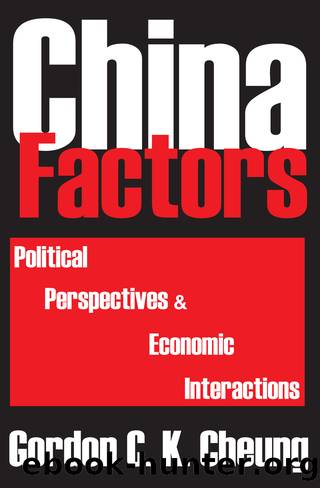China Factors: Political Perspectives and Economic Interactions by Gordon Cheung

Author:Gordon Cheung [Cheung, Gordon]
Language: eng
Format: epub
Tags: Political Science, General
ISBN: 9781351528818
Google: PJguDwAAQBAJ
Goodreads: 39207629
Publisher: Routledge
Published: 2007-07-01T00:00:00+00:00
Liminal Citizenship: Hong Kong Searching for New Identity
Political Changes and Socio-economic Adaptability
On the midnight of June 30, 1997, I was employed by the American magazine Newsweek as an interpreter and assigned to go to the border of Hong Kong, which was connected with Shenzhen (a neighboring Chinese city), to interview those people who came out to celebrate the changeover and to welcome the incoming troops from China.6 Jubilation, flag waving, and cheerfulness culminated with a downpour of rain to form a unique picture of the new political development of Hong Kong. In fact, most of the respondents said that they welcomed the retuning of Hong Kong to China, and it was very good to be governed once again by the Chinese. Yet, no one knew how many of them were spontaneous and how many of them were politically motivated.
However, political change involved many social and cultural factors. The jubilation was to be followed by a lengthy process of reintegration which involved different levels of adjustment and struggle. The changeover of Hong Kong was unique in the sense that it was performed in a very peaceful way. Both the British government and the PRC joined together in a celebration which was regarded by both as an historic moment. Nothing in the historic de-colonization of the former colonies of Great Britain came close to such a peaceful transference of political sovereignty. Though the term de-colonization had been uttered, it is not fair to equate the changeover of Hong Kong to the independent movements in the 1950s and the 1960s. First, there was no civil war destroying millions of lives as in other post-colonial independent movements. Second, Hong Kong was governed once again by the Chinese. It appeared to many that it did not matter too much whether the troops moving into Hong Kong from China were from the Chinese Communist Party (CCP) or from the Kuomintang (KMT), as long as they were Chinese. Third, Hong Kong was very prosperous and remote from the depressed economic situations of former colonies in Southeast Asia, Latin America, and Africa after World War II.
Nevertheless, the absorption of between Hong Kong into China does provide some soul-searching questions for the social-political development of Hong Kong after 1997. On March 10, 2005, Tung Chee Hwa, announced his resignation due to a health problem (an unconvincing excuse, however!).7 His resignation signaled an end to the first phase (eight years) of the implementation of âone country, two systemsâ after Hong Kong was returned to China in 1997. In his 2005 Policy Speech, he finally admitted the weakness of his governance stating, âIn retrospect, our mindset was inadequately prepared for the dual impacts of political change and economic downturn, nor did we have the necessary experience to respond appropriately.â8 This timely self-criticism correctly pointed to the very essence of the challenge and problem of governing Hong Kong under the âOne country, two systemsâ principle. However, in the case of Hong Kong, after the collapse of the housing market, the risk of
Download
This site does not store any files on its server. We only index and link to content provided by other sites. Please contact the content providers to delete copyright contents if any and email us, we'll remove relevant links or contents immediately.
What's Done in Darkness by Kayla Perrin(25500)
Shot Through the Heart: DI Grace Fisher 2 by Isabelle Grey(18219)
Shot Through the Heart by Mercy Celeste(18160)
The Fifty Shades Trilogy & Grey by E L James(17774)
The 3rd Cycle of the Betrayed Series Collection: Extremely Controversial Historical Thrillers (Betrayed Series Boxed set) by McCray Carolyn(13189)
The Subtle Art of Not Giving a F*ck by Mark Manson(12912)
Scorched Earth by Nick Kyme(11831)
Stepbrother Stories 2 - 21 Taboo Story Collection (Brother Sister Stepbrother Stepsister Taboo Pseudo Incest Family Virgin Creampie Pregnant Forced Pregnancy Breeding) by Roxi Harding(11040)
Drei Generationen auf dem Jakobsweg by Stein Pia(10216)
Suna by Ziefle Pia(10185)
Scythe by Neal Shusterman(9259)
International Relations from the Global South; Worlds of Difference; First Edition by Arlene B. Tickner & Karen Smith(8608)
Successful Proposal Strategies for Small Businesses: Using Knowledge Management ot Win Govenment, Private Sector, and International Contracts 3rd Edition by Robert Frey(8419)
This is Going to Hurt by Adam Kay(7695)
Dirty Filthy Fix: A Fixed Trilogy Novella by Laurelin Paige(6453)
He Loves Me...KNOT by RC Boldt(5804)
How to Make Love to a Negro Without Getting Tired by Dany LaFerrière(5378)
Interdimensional Brothel by F4U(5304)
Thankful For Her by Alexa Riley(5161)
